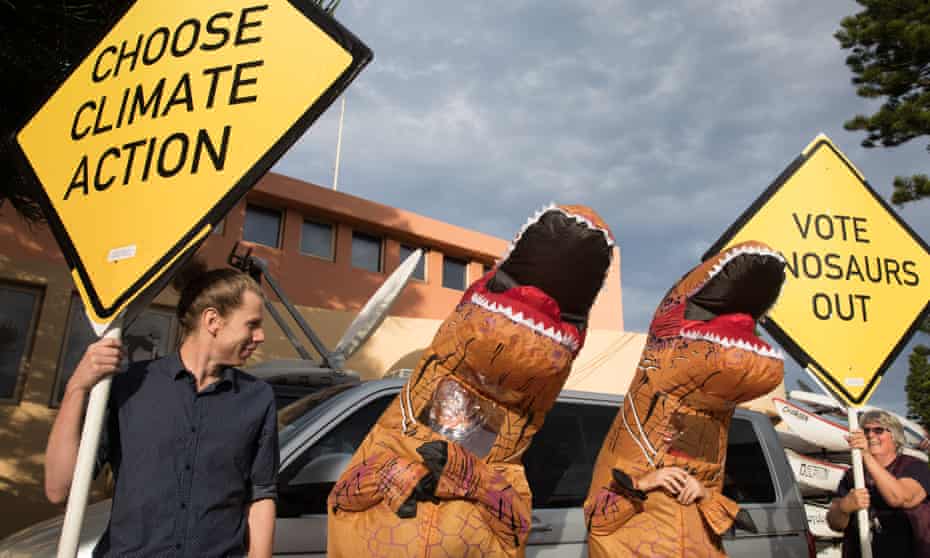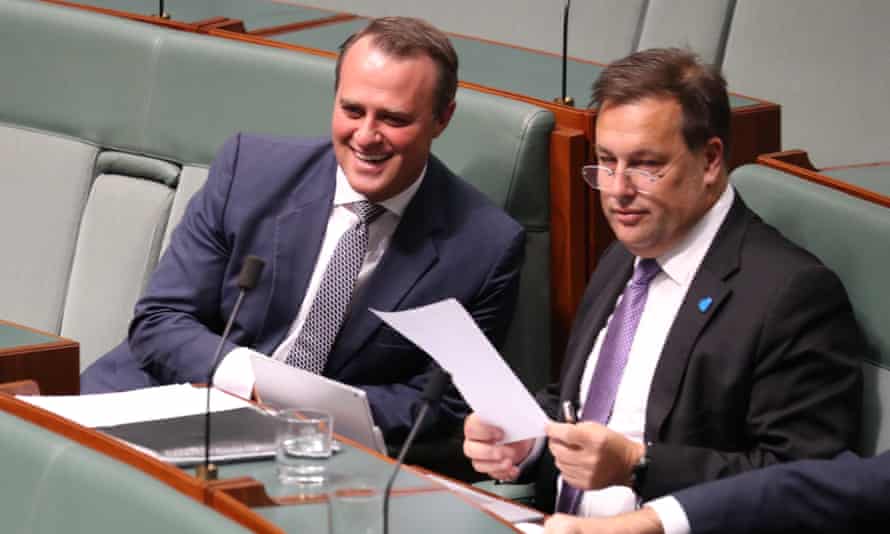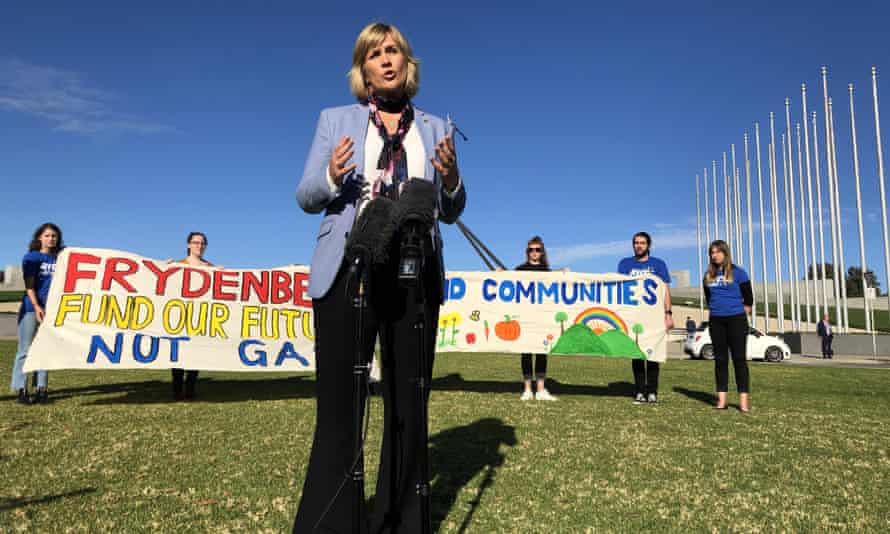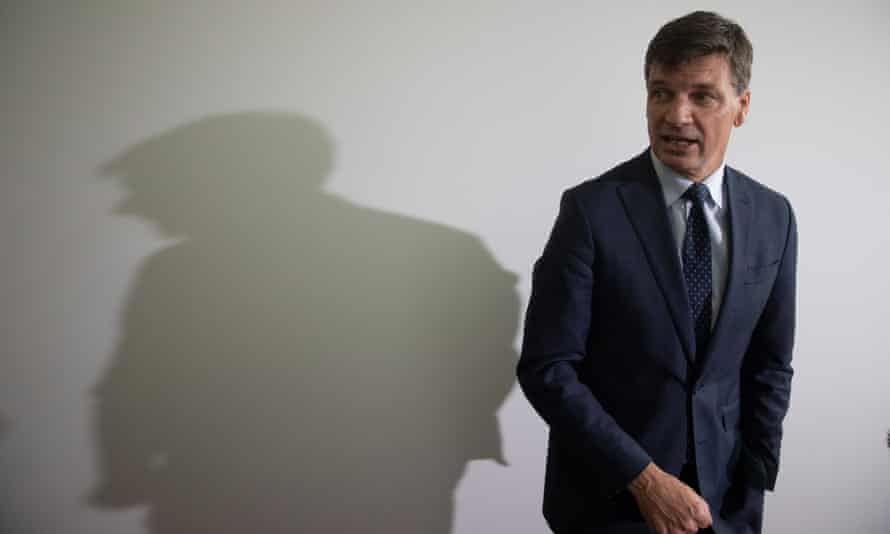Backed by Climate 200’s $3.6m war chest, independent challengers circle Coalition seats

‘Lapsed Liberals’ and grassroots community groups are fielding high-profile candidates. Their target: the balance of power in Australia’s 2022 election
At the last federal election, the Coalition faced challenges from a string of hopeful independents in rural and city seats, largely running on climate issues. With two exceptions – Zali Steggall in Warringah and Helen Haines in Indi – they came up short.
Next year the independents will be back for another shot, focusing on heartland Coalition seats in New South Wales and Victoria. The difference this time is there is a road-tested model of how to mobilise the local community and run a campaign, and a $3.6m war chest on offer from Climate 200, a group established by the climate activist Simon Holmes a Court.
Inspired by Steggall, Haines and her predecessor in Indi, Cathy McGowan, “Voices of” or “Voices 4” community groups have proliferated, turbocharged by the Liberals’ slowness in adopting a net zero target for 2050 and the rolling scandals in federal politics.
Will the outcome be different this time?
“We are at an inflection point,” Holmes a Court says. “A lot of the services provided by a major party are not needed to run a campaign any more.”
He points to the success of online meetings, crowdfunding and social media to spread the word and organise. Climate 200 offers to add large-scale fundraising, legal and political support, polling and campaign strategy.
This time around the target is not a just an independent voice in parliament but the balance of power. If independents threaten to make serious inroads the Coalition will face a nightmare scenario as it simultaneously defends a raft of marginal electorates from Labor in Queensland, western Sydney and Western Australia.
The Coalition now has 76 seats in the 151-seat parliament. Labor needs to win eight seats to govern in its own right.
“If we can just win two or three seats it’s highly likely there will be a minority government,” Holmes a Court says. “We will be back in the situation in 2010, where the independents will have a tough decision to make and, whichever way they go, they will give the government of the day the backbone to deal with the issues we care about.”
The flashpoints
There are many seats with “Voices of” groups, but among the main ones to watch are five in Sydney – Warringah, Wentworth, Mackellar, North Sydney and Hughes – and three in Melbourne – Kooyong, Goldstein and Flinders – as well as Hume in regional NSW and Indi and Nicholls in regional Victoria.

Action on the climate emergency remains the No 1 issue for the community-based groups, followed closely by concerns about integrity in politics and the lack of gender diversity.
MPs facing independent challenges including Jason Falinski in Mackellar and Tim Wilson in Goldstein have dismissed the Voices movements as simply Labor and Greens supporters masquerading as independents and point out that that they have sprung up only in conservative seats.
But Falinski acknowledges they are a threat. “Any group that is well-funded by big tech billionaires and trust fund kids from Sydney’s eastern suburbs or inner Melbourne you have to take seriously,” he says.
“But when it comes to ideas, policy and serving the community it is a lot less clear what alternative they are providing. And even less clear what they can action once in parliament.”
But Holmes a Court says the impetus for the groups comes from the grassroots.
“We are not starting any campaigns, we are helping to turbocharge them. They rise up in seats where people feel very strongly they are being misrepresented.”
Some local Liberals, including the MP for the NSW state seat of Pittwater, Rob Stokes, have engaged with Voices of Mackellar, perhaps wary that the 1,000 people who have attended its events are ignored at their peril.
Anne Capling, a retired professor of politics from Melbourne University, who is spearheading the campaign for an independent in Kooyong, says Labor has already faced one watershed moment among its supporters, losing voters in the 1990s and 2000s to the Greens on the left and to One Nation on the right.
“I think the same thing is happening to the Liberals. Progressive voters are looking at independents. On the right, the Liberals are still tethered to the Nationals and the Christian right is gaining traction in the party.”
No-so-blue ribbon Wentworth
Undeterred that the previous independent, Kerryn Phelps, failed to hold the seat by about 2,300 votes in 2019, a group of wealthy citizens have been working for months to recruit the ideal candidate to connect with the progressive voters of Wentworth, formerly held by Malcolm Turnbull – now one of Scott Morrison’s fiercest critics on climate.
It’s believed the group have identified a candidate – someone with deep roots in Sydney’s eastern suburbs and the pizazz of Steggall – to be announced before Christmas.
They have an office and staff, and have already amassed close to $500,000.
“Our biggest issue is that the Liberal party no longer represents this community,” says Lyndell Droga, spokesperson for Wentworth Independents. “Both parties lack the ambition required on climate change to really set up Wentworth and Australia for the new economic opportunities.”
The MP, Dave Sharma, is on the moderate wing of his party, as are most of the other Liberals in seats targeted by independents.
Sharma led the charge to nudge the party towards a more ambitious emissions target for 2030. In a speech at the University of NSW in September, he called for it to commit to 40% to 45% reductionby 2035. But, as Droga points out, nothing has happened.
“Even when the local member advocates for modest action on climate policy, he is quite clearly ignored. It is quite clear to us now that a vote for the Liberal party in Wentworth is simply giving the casting vote on climate change to Barnaby Joyce and the National party.
“We believe that, with the right candidate, we will give the people of Wentworth a genuine choice of someone who reflects their values.”
Sharma declined to comment.
Northern beaches exposure
The Liberals have searched for a star candidate to unseat Steggall in Warringah but so far have come up empty-handed.
The barrister Jane Buncle is said to be the current frontrunner but, with preselections still to be held, the launch ramp for an unknown Liberal is short and Steggall’s profile is high.
The mood of optimism for independent campaigns has infected neighbouring seats.
Kylea Tink has announced her candidacy in Trent Zimmerman’s seat of North Sydney, supported by a strong local campaign machine and Climate 200. In Mackellar, on the northern peninsula, the search is on for a candidate.
Anyo Geddes of Mackellar Rising says “incredible people at the peak of their careers” have offered to stand.
“It’s clear that the so-called [Liberal] ‘moderates’ are impotent, particularly against the influence of Barnaby Joyce,” she says. “There’s a huge trust deficit with our local member saying one thing, then voting the same way as the Nationals and the right faction within his party.”
One local issue is also proving potent – whether the government will formally extinguish the petroleum exploration licence PEP-11, which extends offshore from Newcastle to Wollongong. The licence is about to expire, but so far the minister responsible, the Nationals’ Keith Pitt, has not acted, prompting a ferocious campaign on the northern beaches.

Falinski says PEP-11 is “dead in the water” and that Steggall’s bill to kill it off risks opening the federal government to compensation claims.
“No one has been stronger in the opposition to PEP-11 than I have,” he says. “I have been critical of the minister, the permit holder and the Labor government who introduced this in 1999.”
But Geddes says there is “enormous demand” to shut down the licence for good.
“Pep-11 is clearly a bargaining tool that Keith Pitt is holding onto in the same way that the Nationals held the Scott Morrison to ransom over setting a 2050 target,” she says.
?Drum beats in Victoria
The latest independent threatening a rural National party seat is Greater Shepparton’s deputy mayor, Rob Priestly – he owns a string of dry-cleaning businesses – who is running for the regional Victorian seat of Nicholls.
The area has experienced independent representation at state level – and the renewed attention it brings from the major parties – after Suzanna Sheed’s win in 2014.
Damian Drum has held Nicholls since 2016 with a healthy 20% margin, making it one of the safest seats in Australia. But there are rumours that he may retire, and it is understood Priestly was sounded out by the Nationals before he decided to run as an independent.
Deep fissures between the Victorian and Queensland Nats have been exacerbated by the debate about emissions.
“Barnaby Joyce is not liked in this part of the world,” Priestly says. “This is a conservative seat but they are also serious about climate change …
“Farmers in this electorate know that the climate is changing. Our food processors know we need a meaningful climate and energy policy for the future, not something dusted off from the 1950s, and setting the target is not enough.”
The Melbourne push
Sue Barrett of Voices of Goldstein says the group has about 1,000 people on its database and more than 200 volunteers. It is close to choosing its candidate, likely to be a high-profile woman.
Goldstein, based around the bayside suburb of Brighton, is held by the Liberal Tim Wilson, who seems unfazed by the prospect of an independent challenger.
“They’re just the same faces who turn out at elections wearing a green or red T-shirt, and now they’re wearing purple looking for a puppet candidate to pretend they’re independent,” he says.
The result, he says, will be a sharp decline in the vote for the Greens and Labor, pushing down their electoral funding and their Senate vote – “so I wish them well in that endeavour”.
Wilson says potential candidates have been “shocked that they have to sign up to a rigid policy platform that would mean they’d just be a puppet”.
This is strongly disputed by Barrett, who says potential candidates are asked to commit to advancing the group’s two main goals – action on climate change and integrity in politics – as well as a more general statement on promoting social cohesion and economic prosperity.
They are also asked sign the politicians’ pledge drafted by the St James Ethics Centre, which sets out an ethical framework for elected representatives.
“We certainly have not said we would dictate policies – we are not a party. But to receive our endorsement, they must support the two key areas that our supporters have identified as important to them.”
In the seat held by the treasurer, Josh Fydenberg, the Kooyong Independents have advertised for a candidate in the Age and the Australian Financial Review.

Climate 200 polling by Community Engagement in October had the Liberals comfortably ahead with 34.4% of first preferences, compared with just 7.5% for an independent and 13.5% for the Greens. But with a notional candidate of the calibre of Steggall or Haines, the independent vote rocketed up to 26.3%, while the Liberal vote fell to 25.9%.
Holmes a Court, who lives in Kooyong, says: “The people who are most passionate here are the lapsed Liberals.”
Wilson, whose seat showed a similar trend, says the polling is “rubbish” and “designed to assist Climate 200’s fundraising”.
Hume and Hughes hopefuls
Independents are also planning to run in Hume, the seat of the energy minister, Angus Taylor. Penny Ackery, a special education teacher from Goulburn, was announced as a candidate on Saturday at Goulburn showgrounds.
The nature of the seat makes the task harder: it stretches from Sydney’s outer fringe to Bowral and Mittagong, which are increasingly home to retirees and tree changers, and through to prime National party territory around Goulburn.
Hughes, the southern Sydney seat held by Craig Kelly, who defected from the Liberals to the Palmer United party, is set to face a messy multi-horse race.
As well as Labor, Liberals and Kelly, there will be two independents spawned by the community group We Are Hughes.
The corporate lawyer Georgia Steele has already announced her candidacy and another member of the group is expected to stand.
So what does it mean for the Liberals if independents sweep out some of its most prominent moderates?
Holmes a Court says the long-term effect would be positive.
“The Liberal party might lose three MPs who say they care about climate change but who have delivered nothing in the last three years. The price for that is the Coalition will spend a few years in the wilderness, re-evaluating their opposition in dealing with these issues.”